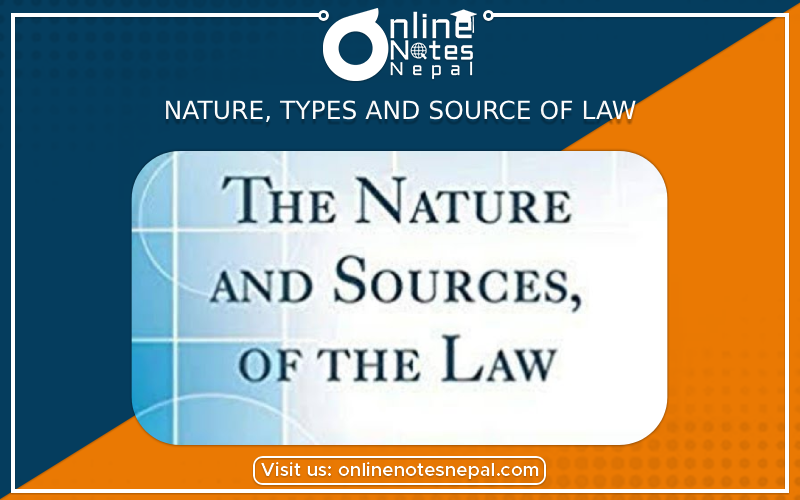Published by: Anu Poudeli
Published date: 02 Aug 2023

Individuals, companies, and governments are governed by law, which is a fundamental feature of human society. It establishes a framework for resolving conflicts, upholding rights, and keeping the peace. grasp a country's or society's legal system requires a grasp of the nature, types, and sources of law.
Let's look at each of these points individually:
Law's Nature:
The qualities and essential concepts of law are referred to as its nature. It can be classified into several types based on its characteristics:
a.Positive law : It is made up of written rules and regulations that are openly specified and implemented by the government. It is usually produced and codified by legislative or executive entities.
b. Natural Law: According to natural law, certain moral rules are inherent in the nature of mankind and the universe. This viewpoint holds that laws should be based on objective moral principles, and that an unjust rule is not a true law.
c. Common Law: A legal system formed from judicial decisions and precedents established by courts over time is known as common law. It is based on the principle of stare decisis, which states that subordinate courts must accept higher courts' decisions in similar circumstances.
d.Civil law : It is a legal system based on extensive rules and statutes that serve as the major source of law. In civil law regimes, courts typically implement and interpret these codes rather than creating new ones.
e.Religious law : It is founded on the religious scriptures and beliefs of a specific faith or religious community. Religious law coexists with or supports secular legal systems in various nations.
Different types of law exist:
distinct types of legislation handle distinct areas of human existence and interactions:
a. Criminal Law: Criminal law is concerned with offenses committed against society as a whole. It defines crimes and imposes penalties for criminal behavior.
b. Civil Law: Civil law controls the interactions of people, organizations, and institutions. Contracts, property, torts, and family law are all covered.
c. Constitutional Law: Constitutional law establishes and governs a country's government's structure, powers, and restrictions. It also guarantees citizens' fundamental rights and liberties.
d.Administrative law : It governs the operations and activities of administrative agencies, ensuring that they act within their power and conform to procedural fairness.
e. International Law: International law governs the interactions of nations and international organizations. Treaties, customary practices, and principles regulating state interactions are all included.
Sources of Law:
The origins from which legal rules and principles are developed are referred to as the sources of law. The fundamental sources of law differ per legal system, but they commonly include:
a.Legislation: Laws enacted by legislative bodies such as parliaments or congresses.
b. Constitutions: A country's fundamental law detailing the organization of the government and safeguarding individual rights and liberties.
c. Precedents: Judicial decisions and legal interpretations that serve as precedents for future cases.
d. Custom: Long-standing community customs and traditions that have become legally enforceable.
e. Treaties and International Agreements: Legally binding agreements between countries or international organizations.
f. Religious Texts: Religious texts play a role in shaping legal ideas and procedures in some civilizations.
Anyone involved in legal affairs or interested in the operation of a legal system must understand the nature, types, and sources of law. These elements constitute the foundation of any legal system and contribute to a fair and just society.